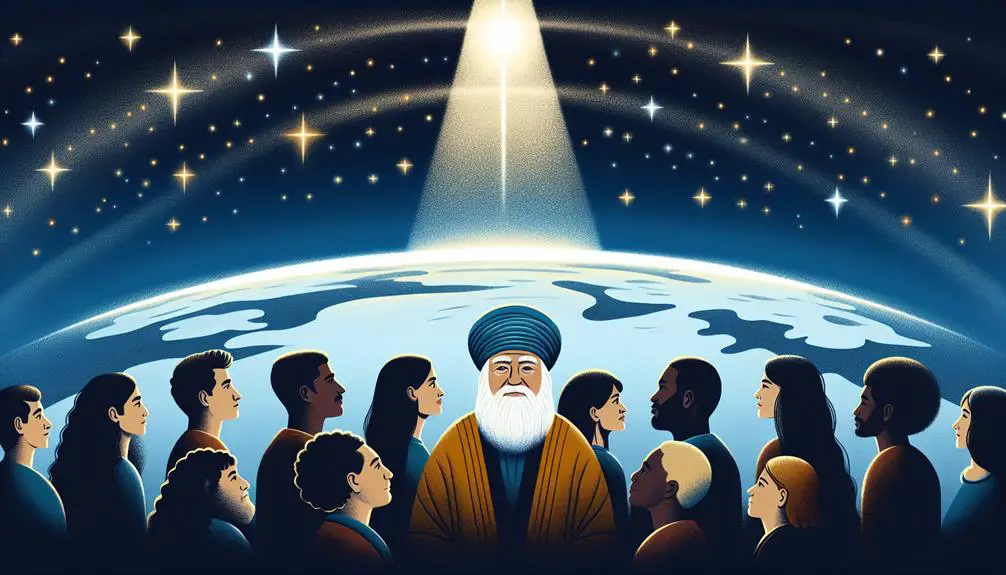See why biblical figures deemed 'highly favored' reveal a deeper, divine message about favoritism and faith.

Highly Favored in the Bible
You've likely heard the term 'highly favored' mentioned in religious contexts, but have you ever wondered what truly sets these biblical figures apart?
From Mary, celebrated as blessed among women, to David, known as a man after God's own heart, the idea of divine favor plays a pivotal role.
Exploring the lives of these individuals not only sheds light on their remarkable journeys but also prompts you to consider the nature of favoritism in a divine context.
What makes someone 'highly favored,' and could there be a deeper, more universal message within these stories waiting to be uncovered?
Key Takeaways
- Divine favor marks individuals for extraordinary paths, equipping them with resilience and wisdom for pivotal roles.
- Mary's unique role and Immaculate Conception highlight her significance and ongoing influence as an intercessor in the faith community.
- Abraham's covenant with God underscores the impact of divine favor on shaping destinies and the emergence of nations.
- Moses and David exemplify divine calling and faith, demonstrating leadership, obedience, and a deep, personal relationship with God.
The Significance of Divine Favor

Within the biblical context, divine favor represents a transformative force that significantly shapes the destinies of individuals and nations, underscoring its paramount importance in the unfolding of God's plan. You'll find that this favor isn't merely a passive blessing but activates grace implications that resonate through the lives of those it touches. The stories woven throughout the scriptures vividly illustrate how divine favor, when bestowed upon someone, sets them on a path that diverges markedly from the ordinary, catapulting them into roles and missions that far exceed human expectations.
The favor outcomes seen in the Bible are manifold and profound. For instance, when you consider the lives of biblical figures such as Joseph and Daniel, it's clear that divine favor didn't exempt them from trials. Instead, it equipped them with resilience and wisdom, turning their challenges into stepping stones for greater achievements. Their stories teach that divine favor often ushers in a period of preparation and testing, where faith is refined and character is built, readying individuals for the pivotal roles they're to play in God's narrative.
Moreover, divine favor elevates the notion of grace beyond mere unmerited kindness; it becomes a dynamic, life-altering endowment. This favor doesn't operate on worldly principles of merit but on divine prerogatives that choose the unlikely, making shepherds kings and turning persecutors into apostles. Thus, understanding the significance of divine favor isn't just about recognizing its impact on biblical characters; it's about realizing its potential to transform your own life when you align with God's sovereign will.
Mary: Blessed Among Women

Among the myriad examples of divine favor in the Bible, Mary's designation as 'blessed among women' stands out as a profound testament to the transformative power of God's grace in an individual's life. This remarkable status isn't merely a title but a reflection of her unique role in salvation history, underscored by the doctrines of the Immaculate Conception and her numerous Marian apparitions.
The Immaculate Conception, a doctrine deeply rooted in Catholic theology, posits that Mary was conceived without original sin. This singular privilege underscores her preordained role as the Mother of God, setting her apart in the divine narrative. It's a concept that exemplifies the depth of God's preparation and favor towards those chosen for specific purposes, making Mary a quintessential figure of purity and obedience in Christian tradition.
Moreover, the Marian apparitions throughout history serve as tangible manifestations of Mary's continued influence and her special place in the hearts of believers. These apparitions, varying in message and context, consistently echo her role as an intercessor and a maternal figure, guiding the faithful towards a deeper understanding of God's will.
Analyzing Mary's life and her divine favor through these lenses, it's evident that her blessed status among women isn't just about her being chosen to bear the Christ child. It's also about her exemplary faith, her unwavering obedience, and her enduring presence in the spiritual life of the church. Through her, we see the embodiment of divine favor, not as a mere privilege, but as a call to serve, obey, and profoundly impact the faith community.
Abraham: Father of Nations

As we turn to examine Abraham, often heralded as the 'Father of Nations,' it's clear that his journey encapsulates the essence of divine favor and covenantal promise in biblical narrative. His story isn't just one of personal faith; it's a foundation for understanding how covenant significance and prophetic promises shape the destinies of peoples and nations.
Abraham's call and subsequent covenant with God represent a pivotal moment in the biblical account. You see, it wasn't merely about land or progeny but a deeper, more profound assurance of blessing and divine favor. This covenant wasn't just a contract but a binding promise from God that Abraham's descendants wouldn't only be numerous but would inherit a significant role in the redemption of humanity.
The prophetic promises given to Abraham further underscore his critical role. God didn't just foresee a multitude of descendants; He envisioned nations and kings emerging from this one man. This wasn't a simple future prediction; it was a divine assurance that through Abraham, all the families of the earth would be blessed. This promise of blessing ties back to the covenant, highlighting its significance not just for Abraham but for the entire world.
In reflecting on Abraham's story, it's evident that his faith and the divine favor upon him were instrumental in the unfolding of God's redemptive plan. The covenant with Abraham stands as a testament to God's faithfulness, setting a pattern of prophetic promises and divine favor that echo throughout the biblical narrative.
Moses: Liberator of Israel

Transitioning from the foundational narrative of Abraham, we encounter Moses, who emerges as a pivotal figure in the liberation of Israel from Egyptian bondage. His life's journey, marked by divine encounters and leadership challenges, illustrates a profound narrative of faith, resilience, and divine favor.
The burning bush episode stands as a central event in Moses' life, symbolizing not just a divine call but also the unique relationship he held with God. This moment, where the divine presence communicated through a miraculously unconsumed bush, signifies Moses' commissioning as God's chosen instrument for Israel's deliverance. It's at this juncture you see Moses' transformation from a shepherd in Midian to a leader with a divine mandate.
Moses' confrontations with Pharaoh highlight a narrative of defiance and divine intervention. Pharaoh's defiance against releasing the Israelites underscores a battle not merely between two men, but between divine will and human obstinacy. Each plague, culminating in the Passover, demonstrates a progressive revelation of God's power and judgment, compelling Pharaoh to relent, albeit temporarily.
Your understanding of Moses' role is incomplete without recognizing his intercessory part. Standing between an often disobedient people and a holy God, Moses exemplifies leadership that's both compassionate and uncompromising in its adherence to divine directives. His life, entwined with miraculous signs, guidance through the wilderness, and the reception of the Law, embodies a legacy of faith, obedience, and the pursuit of God's promises.
Moses' story, therefore, isn't just about liberation from physical bondage but also about the journey towards spiritual emancipation and covenant relationship with God.
David: A Man After God's Own Heart

Shifting our focus to David, we find a figure deeply defined by his heart's alignment with God's desires, a testament to his unique standing as a man after God's own heart. This distinction isn't lightly given; it's earned through a life that, while fraught with challenges, exemplifies an unwavering faith and devotion to God. David's psalms, a profound collection of poetic worship, underscore this relationship. They aren't just religious texts; they're intimate conversations, cries of a soul yearning for divine presence and guidance. These psalms reflect a spectrum of human emotion, from despair to exultation, always returning to the steadfast belief in God's sovereignty and goodness.
The Goliath battle stands as a pivotal moment, not just in David's life but in the narrative of faith itself. It's here that David's trust in God is most visibly actioned. Facing a giant, armed with little more than a sling and his faith, David's victory is often cited as the triumph of belief over doubt, of divine favor over earthly might. This event isn't merely a historical or biblical account; it's a lesson on the power of faith and the importance of God's favor.
David's life, marked by both triumphs and failures, serves as a rich tapestry of lessons on the complexities of faith. His story encourages believers to seek alignment with God's will, demonstrating that God's favor isn't about perfection but about a heart wholly devoted to Him.
Frequently Asked Questions
How Do Modern Theologians Interpret the Concept of Divine Favor in the Context of Contemporary Social and Ethical Issues?
You're exploring how modern theologians view divine favor today, especially through the lenses of social justice and ethical leadership.
They analyze it as a call to action, urging communities to embody values that promote fairness and integrity. This interpretation suggests that being favored by the divine isn't just about personal blessings but involves actively contributing to a more equitable and morally sound society.
It's a scholarly and reverent approach, deeply analyzing contemporary social and ethical challenges.
Are There Any Lesser-Known Biblical Figures Who Were Considered Highly Favored by God, and What Was Their Significance?
Yes, there are lesser-known figures who found favor with God, showcasing that not all heroes wear capes. Enoch's walk with God was so intimate that he was taken to heaven without dying, a testament to his righteousness.
Meanwhile, Jabez's prayer for blessing and protection was granted, illustrating God's responsiveness to heartfelt petitions. These stories underscore the diverse ways individuals can experience divine favor, beyond the usual biblical headliners.
How Does the Concept of Being "Highly Favored" Relate to the Idea of Predestination, and What Are the Differing Views on This Within Christianity?
You're diving into how being 'highly favored' intersects with predestination, sparking the Grace vs. Works, Election Debate within Christianity.
Some believe grace alone marks the elect, aligning with predestination, suggesting no work can earn favor. Others argue for a synergy between grace and deeds.
This debate points to deeper theological divides, showing how interpretations of divine favor and predestination vary, reflecting a rich tapestry of belief within the Christian faith.
In What Ways Can Individuals Today Seek or Understand Their Own Experience of Divine Favor, According to Different Christian Denominations?
You're exploring how to perceive divine favor in your life. Different Christian denominations suggest engaging in faith practices and spiritual disciplines. These include prayer, meditation, and service to others.
How Is the Concept of Divine Favor Explored in Other Religious Texts Outside of the Bible, and What Parallels Can Be Drawn?
Exploring divine favor in religious texts outside the Bible, you'll find Islamic Mercy and Hindu Bhakti offer deep insights. These concepts mirror the grace and favor found in Christian texts, emphasizing a personal connection with the divine.
Islamic texts highlight God's mercy as encompassing, while Hindu scriptures focus on devotion (Bhakti) as a path to divine favor. Both stress a direct, personal relationship with the divine, akin to the Christian experience.
Conclusion
Ironically, while you've been seeking divine favor in grand acts, it's nestled in the humility of Mary, the obedience of Abraham, the courage of Moses, and the heart of David.
These heroes weren't without flaws, yet their stories illuminate a profound truth: favor isn't about perfection, but faithfulness.
As you navigate your journey, remember, it's not the magnitude of your actions, but the sincerity of your heart that aligns you with the divine.
Truly, the favored are those who simply believe.



Sign up